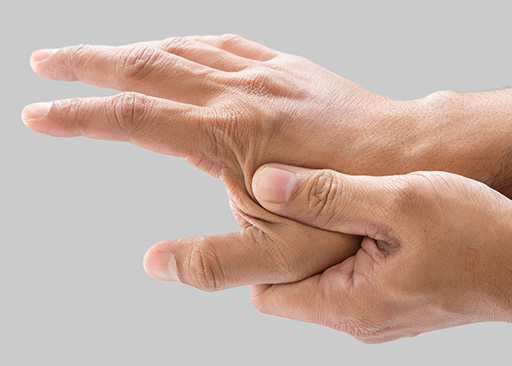Breaking the Cycle: A Guide to Neuropathy Pain Relief

We will cover everything from understanding what neuropathy pain management is and what causes it to respond to different types of medications and alternative therapies that can help manage the symptoms. We will also talk about lifestyle changes such as exercise and diet that can help prevent flare-ups and manage long-term conditions. Lastly, we will review coping strategies and when to seek professional help.
Understanding Neuropathy Pain
Neuropathy is a disorder that occurs due to damage to the nervous system, including peripheral nerves extending from the brain and spinal cord to other body parts. This can cause focal neuropathy, and damage to one specific nerve, resulting in sudden and painful weakness in the affected area. Addressing it involves the root cause of nerve damage and developing tailored plans to control symptoms.
Neuromas can also cause nerve pain in various body parts, making custom orthotics, wider shoes, massage therapy, steroid injections, or surgery necessary. Carpal tunnel syndrome is another common type that can affect people and cause nerve compression in the wrist. Understanding neuropathy pain is essential for developing a plan for effective relief.
What Causes Neuropathy Pain?
Neuropathy pain can be a debilitating condition affecting millions of people worldwide. It occurs due to damage to a specific nerve or group of nerves, leading to weakness and sudden, intense pain. There are many causes, including Diabetes, Chemotherapy, Trauma or injury, and Infections. Most cases go away in weeks or months with no lasting damage. Understanding what causes it is essential in finding relief for those suffering.
Types of Neuropathy Pain
There are several types of pain, each with its symptoms and causes. Focal neuropathy causes weakness in a specific nerve or group of nerves, such as carpal tunnel syndrome. Neuromas, commonly in the foot, can cause nerve pain and require orthotics or surgery. Peripheral neuropathy symptoms vary depending on the type of nerves damaged, including motor, sensory, and autonomic nerves.
Fortunately, there are several options available for nerve pain caused by neuropathy. These include medication, physical therapy, and surgery if necessary. Working with a healthcare provider to find the best plan for individual needs is essential. Understanding the different types of neuropathy pain symptoms makes it possible to break the cycle of chronic pain.
A dry mouth is a common symptom of neuropathy pain. Some therapies and procedures might help ease the signs and symptoms of peripheral neuropathy. Some drugs like duloxetine, venlafaxine, and desvenlafaxine can also reduce the pain caused by diabetic neuropathy.
Medications
Several medications are available, including anticonvulsants and antidepressants like Gabapentin and Amitriptyline. These drugs act by modifying how nerves transmit signals in the body. Better management of underlying conditions such as diabetes can significantly improve neuropathic pain. Physical therapy, surgery, and injections are other options for peripheral neuropathy. Over-the-counter painkillers can provide temporary relief.
Focal neuropathy, such as carpal tunnel syndrome, can be painful but usually resolves independently within a few weeks or months. It is essential to consult with a healthcare professional before starting any medication plan for neuropathic pain. They can help determine the best course of action based on individual circumstances and the severity of symptoms.
Anticonvulsants
Regarding neuropathic pain, medications are often prescribed to help manage symptoms. Anticonvulsants, such as gabapentinoids, are commonly prescribed as they can interfere with pain signals. Corticosteroids can also relieve severe inflammation when taken orally or injected.
In addition to these prescription options, over-the-counter pain medications, antidepressants, cannabinoids, and topical medications have also been shown to be effective. Physical therapy and reducing discomfort with over-the-counter painkillers may also help manage peripheral neuropathy.
Topical Analgesics
Topical analgesics can also be effective in providing relief for peripheral neuropathy symptoms. These over-the-counter creams and ointments contain ingredients like capsaicin, lidocaine, and menthol that work to numb the affected area. Natural options such as acupuncture and massage therapy have also shown promise in reducing neuropathy symptoms.

Adjuvant Analgesics
Adjuvant analgesics are a group of medications that can be combined with other pain relievers to help alleviate it. Corticosteroids, an adjuvant analgesic, can relieve severe neuropathic pain through their anti-inflammatory effects. Additional medications, including injections and patches, can also be used.
In some cases, neuromodulation or cognitive behavioral therapy may be recommended. In severe cases, surgery may be necessary to address the underlying cause.
Corticosteroids
Corticosteroids are anti-inflammatory medications that can be taken orally or injected to alleviate severe neuropathy pain. These drugs work by reducing inflammation and swelling in the affected nerves, which can help to alleviate discomfort. Injections for increased nerve pressure and over-the-counter painkillers such as ibuprofen or aspirin can also effectively reduce peripheral neuropathy pain.
Several medications are available for children and teens, including gabapentin and pregabalin. Dosages for these medications are typically created individually for each patient based on their weight and specific symptoms. Corticosteroids like prednisone can also effectively reduce extreme neuropathic pain caused by nerve irritation and inflammation.
Over-The-Counter Medications
Over-the-counter medications can be an effective way to manage neuropathy pain. Common painkillers like ibuprofen and aspirin can help reduce symptoms, although NSAIDs such as Aleve and Motrin may not effectively target it. Topical OTC medications like Absorbine Jr, Flex-All, and Tiger Balm can also help soothe muscles.
For more moderate neuropathic pain, oral medications like acetaminophen and NSAIDs can be taken in moderation to control symptoms. However, it’s important to note that prolonged use of these medications can negatively affect the liver and kidneys.
In severe cases, corticosteroids may be prescribed by a doctor. These medications effectively reduce inflammation and relieve severe nerve pain but should only be used for short periods due to adverse side effects.
Alternative Therapies for Neuropathy Pain Relief
While medications can help manage neuropathy pain relief, there are also alternative therapies that may provide relief. Natural options for peripheral neuropathy include physical therapy, injections, over-the-counter painkillers, herbal supplements, and acupuncture. Ultimately, multimodal therapy may be necessary, including medication, physical therapy, and psychological counseling.
Lifestyle Changes
Neuropathy pain can be managed through lifestyle changes, medication, and therapy. One of the primary ways to alleviate neuropathy symptoms caused by underlying conditions like diabetes and autoimmune issues is through medication prescribed by a doctor. Also, better-managing diabetes and other conditions can help prevent further nerve damage and alleviate neuropathy pain.
Lifestyle changes like exercise, proper nutrition, and stress management can also help reduce neuropathy pain. Breaking the cycle requires an individualized approach that addresses the condition’s specific causes while relieving its often-debilitating symptoms.
Exercise
Exercise is a necessary lifestyle change for those looking to alleviate neuropathic pain. Incorporating aerobic exercise into a routine for at least 30 minutes a day, three days a week can increase blood flow and release endorphins, acting as natural painkillers. Brisk walking is an excellent example of aerobic exercise that can easily incorporate into daily routines. Before trying any exercises, warm up with dynamic stretching like arm circles to ease into the activity.
Physical, relaxation, and massage therapies can also help ease muscles and relieve symptoms. Consult healthcare providers to learn techniques such as sitting, stretching, standing, and moving to prevent further pain. Relaxation techniques such as breathing exercises, meditation, and yoga can also help release tension and prevent worsening.
It’s essential to consult with a healthcare provider before starting any exercise program or making significant changes to one’s lifestyle. Starting with just 10 minutes of exercise a day can benefit beginners just starting their journey toward neuropathy pain relief.
Diet
Maintaining a healthy diet is one crucial lifestyle change that can help alleviate neuropathy pain. Proper nutrition can help manage underlying conditions like diabetes, which can contribute to nerve damage. Patients with neuropathy should consult with their healthcare provider or a registered dietician to develop a well-balanced meal plan that includes foods rich in essential vitamins and minerals, such as B vitamins, omega-3 fatty acids, and antioxidants. Additionally, avoiding processed foods can also help reduce inflammation and improve overall health, leading to better outcomes.
Avoid Tobacco And Alcohol
One significant change that can be made is avoiding tobacco and alcohol consumption. Smoking and drinking alcohol can hurt nerve health, leading to increased pain and other symptoms associated with neuropathy. By making these simple changes, individuals suffering from neuropathy can reduce their risk of further damage and improve their overall quality of life.
Sleep and Rest
One of the lifestyle changes that can help in improving sleep and rest. Adequate sleep is essential for overall health and can play a significant role in managing neuropathic pain. When we sleep, our bodies repair and regenerate damaged tissues, including nerve tissue. Therefore, getting enough quality sleep can help reduce inflammation associated with neuropathy.
Additionally, taking short naps during the day can help alleviate fatigue and improve overall energy levels. Establishing a consistent sleep routine and avoiding stimulation from caffeine or electronics before bedtime is crucial to promote better quality sleep. By prioritizing adequate rest, individuals with neuropathy may experience significant improvements in their symptoms.
Managing Flare-ups
Managing flare-ups can be challenging, but there are various options available. Anti-inflammatory medications like NSAIDs, antidepressants, and anticonvulsants can help control flare-ups. Topical medications such as capsaicin can provide additional relief by numbing the affected area.
In some cases, epidurals can improve neuropathic pain due to spinal stenosis, herniated discs, or postherpetic neuralgia. Cognitive-behavioral therapy or surgery may also be considered a last resort.
Coping Strategies
In addition to medication, several coping strategies can help to manage flare-ups, such as using heat or cold therapy, practicing relaxation techniques like deep breathing or meditation, and staying physically active through low-impact exercise like walking or swimming.
When to Seek Help
Paying attention to the body and taking action when experiencing a sudden onset of weakness or pain in a specific area is essential. In such cases, seeking medical help immediately is advisable as it could be a sign of a more serious underlying issue. They can help identify the cause of symptoms and provide appropriate options. Remember, early intervention is critical when it comes to managing neuropathy pain.
Preventing Neuropathy Pain
Neuropathy pain can be prevented with the proper precautions. People with peripheral neuropathy should engage in daily foot checks to detect any injuries or potential risks early on and wear foot coverings that have padding to prevent further damage.
Additionally, keeping blood sugar levels under control can help reduce overall pain. By following these steps and making lifestyle changes, individuals suffering from neuropathy can experience relief from their symptoms.
Understand the Causes
Preventing neuropathy pain requires understanding its causes. It can be caused by damage to a specific nerve or group of nerves, leading to weakness. Neuromas, or balls of nerve tissue, can press on nerves and cause pain, commonly occurring in the foot. By identifying and addressing the underlying causes, individuals may be able to prevent or reduce their symptoms.
Ways to Relieve Neuropathy Pain

Relaxation Techniques
Aerobic exercises, balance training, and stretching exercises like arm circles can help increase flexibility and activate nerve signals. Occupational therapists can also teach sitting, stretching, standing, and moving techniques to prevent nerve pain.
Relaxation techniques such as breathing exercises, visualization, and yoga can help release tension and reduce pain. Biofeedback systems, such as BioScan, are electrical devices that manage physiological responses and encourage relaxation techniques. Physical, relaxation and massage therapy can help ease muscle pain, while healthcare providers can teach coping techniques.
